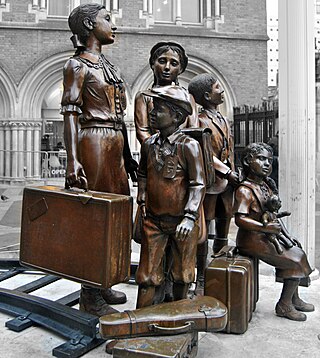Related Research Articles

Immigration has been a major source of population growth and cultural change throughout much of the history of the United States. In absolute numbers, the United States has a larger immigrant population than any other country in the world, with 47 million immigrants as of 2015. This represents 19.1% of the 244 million international migrants worldwide, and 14.4% of the United States' population.

The term multiculturalism has a range of meanings within the contexts of sociology, political philosophy, and colloquial use. In sociology and in everyday usage, it is a synonym for "ethnic pluralism", with the two terms often used interchangeably, and for cultural pluralism in which various ethnic groups collaborate and enter into a dialogue with one another without having to sacrifice their particular identities. It can describe a mixed ethnic community area where multiple cultural traditions exist or a single country within which they do. Groups associated with an indigenous, aboriginal or autochthonous ethnic group and settler-descended ethnic groups are often the focus.

Anti-Americanism is prejudice, fear, or hatred of the United States, its government, its foreign policy, or Americans in general.

German Americans are Americans who have full or partial German ancestry. With an estimated size of approximately 43 million in 2019, German Americans are the largest of the self-reported ancestry groups by the United States Census Bureau in its American Community Survey. German Americans account for about one third of the total population of people of German ancestry in the world.
Cultural assimilation is the process in which a minority group or culture comes to resemble a society's majority group or assume the values, behaviors, and beliefs of another group whether fully or partially.

In sociology, an ethnic enclave is a geographic area with high ethnic concentration, characteristic cultural identity, and economic activity. The term is usually used to refer to either a residential area or a workspace with a high concentration of ethnic firms. Their success and growth depends on self-sufficiency, and is coupled with economic prosperity.

American nationalism, is a form of civic, ethnic, cultural or economic influences found in the United States. Essentially, it indicates the aspects that characterize and distinguish the United States as an autonomous political community. The term often serves to explain efforts to reinforce its national identity and self-determination within their national and international affairs.

Immigration is the international movement of people to a destination country of which they are not natives or where they do not possess citizenship in order to settle as permanent residents or naturalized citizens. Commuters, tourists, and other short-term stays in a destination country do not fall under the definition of immigration or migration; seasonal labour immigration is sometimes included, however.

The sociology of immigration involves the sociological analysis of immigration, particularly with respect to race and ethnicity, social structure, and political policy. Important concepts include assimilation, enculturation, marginalization, multiculturalism, postcolonialism, transnationalism and social cohesion.
Opposition to immigration, also known as anti-immigration, has become a significant political ideology in many countries. In the modern sense, immigration refers to the entry of people from one state or territory into another state or territory in which they are not citizens. Illegal immigration occurs when people immigrate to a country without having official permission to do so. Opposition to immigration ranges from calls for various immigration reforms, to proposals to completely restrict immigration.

Canadians are people identified with the country of Canada. This connection may be residential, legal, historical or cultural. For most Canadians, many of these connections exist and are collectively the source of their being Canadian.
Nativism is the political policy of promoting or protecting the interests of native or indigenous inhabitants over those of immigrants, including the support of immigration-restriction measures.
Criticism of multiculturalism questions the ideal of the maintenance of distinct ethnic cultures within a country. Multiculturalism is a particular subject of debate in certain European nations that are associated with the idea of a nation state. Critics of multiculturalism may argue against cultural integration of different ethnic and cultural groups to the existing laws and values of the country. Alternatively critics may argue for assimilation of different ethnic and cultural groups to a single national identity.
Multiculturalism in Canada was officially adopted by the government during the 1970s and 1980s. The Canadian federal government has been described as the instigator of multiculturalism as an ideology because of its public emphasis on the social importance of immigration. The 1960s Royal Commission on Bilingualism and Biculturalism is often referred to as the origin of modern political awareness of multiculturalism, resulting in Canada being one of the most multicultural nations in the world. The official state policy of multiculturalism is often cited as one of Canada's significant accomplishments, and a key distinguishing element of Canadian identity and Canadian values.

Multiculturalism in Australia is today reflected by the multicultural composition of its people, its immigration policies, its prohibition on discrimination, equality before the law of all persons, as well as various cultural policies which promote diversity, such as the formation of the Special Broadcasting Service.
Sarah J. Mahler is an American author and cultural anthropologist. She was part of a group of anthropologists attempting to change migration studies to a more comprehensive way to understand how migrants crossing international borders remain tied to their homelands and how cultural practices and identities reflect influences from past and present contexts, called "transnational migration."

National Asian American Survey is a nonpartisan organization that conducts representative surveys of the political and social preferences of the Asian American and Pacific Islander population in the United States.

Eric Peter Kaufmann is a Canadian professor of politics at Birkbeck, University of London. He is a specialist on Orangeism in Northern Ireland, nationalism, and political and religious demography. He has authored, co-authored, and edited multiple books on these subjects.
Elizabeth F. Cohen is an American political scientist. She is a professor of political science at the Maxwell School of Citizenship and Public Affairs at Syracuse University and a senior research associate at the Campbell Public Affairs Institute. She is a political theorist who studies citizenship, immigration, and value of time in politics.
Melissa R. Michelson is an American political scientist. She is a professor of political science at Menlo College, and in July 2020 she became the Dean of Arts and Sciences there. She studies voter mobilization and engagement in the United States, particularly among minority communities, as well as public opinion and political communication.
References
- ↑ "How the Belief in American Exceptionalism Has Shaped the Pandemic Response". Smithsonian . Retrieved January 6, 2021.
- 1 2 3 4 5 6 7 8 "People: Deborah Schildkraut". Tufts University. April 2020. Retrieved July 6, 2020.
- ↑ "Review of Press "One" for English: Language Policy, Public Opinion, and American Identity". Education Week. 24 (39): 36. June 8, 2005.
- ↑ Theiss‐Morse, Elizabeth (December 20, 2006). "Review of Press "One" for English: Language Policy, Public Opinion, and American Identity". Political Psychology. 28 (1): 136–139. doi:10.1111/j.1467-9221.2007.00557.x.
- 1 2 Ricento, Thomas (June 2005). "Review of Press "One" for English: Language Policy, Public Opinion, and American Identity". Political Science Quarterly. 120 (4): 706–707. doi:10.1002/j.1538-165X.2005.tb01442.x.
- ↑ Clayton, Thomas (483–484). "Review of Press "One" for English: Language Policy, Public Opinion, and American Identity". Journal of Politics. 68 (2): May 2006. doi:10.1111/j.1468-2508.2006.00420_18.x.
- 1 2 "Americanism in the 21st Century: Public Opinion in the Age of Immigration". Russell Sage Foundation. Retrieved July 6, 2020.
- ↑ Ariely, Gal (March 1, 2013). "Review Americanism in the Twenty-First Century: Public Opinion in the Age of Immigration". Public Opinion Quarterly. 77 (1): 423–426. doi:10.1093/poq/nfs071.
- 1 2 Freeman, Gary P. (September 2011). "Review Americanism in the Twenty-First Century: Public Opinion in the Age of Immigration". Perspectives on Politics. 9 (3): 687–688. doi:10.1017/S1537592711001976. S2CID 144484674.
- 1 2 Shapiro, Robert Y. (April 1, 2012). "Review Americanism in the Twenty-First Century: Public Opinion in the Age of Immigration". Political Science Quarterly. 127 (1): 149–150. doi:10.1002/j.1538-165X.2012.tb02221.x.
- 1 2 "Robert E. Lane Award". American Political Science Association. 2019. Retrieved July 6, 2020.
- ↑ "Spring 2017 Presidential Authority Awards". Russell Sage Foundation. June 19, 2017. Retrieved July 6, 2020.
- ↑ Edsall, Thomas B. (April 29, 2020). "Trump Hasn't Given Up on Divide and Conquer". The New York Times . Retrieved July 6, 2020.
- ↑ Hopkins, Dan (February 10, 2013). "How accents influence the immigration debate". The Washington Post . Retrieved July 6, 2020.
- ↑ Taub, Amanda (July 20, 2015). "Donald Trump and the politics of white insecurity". Vox. Retrieved July 6, 2020.
- ↑ "Demographics Could Be A Challenge To Warren's Prospective 2020 Bid03". WBUR. October 1, 2018. Retrieved July 6, 2020.
- ↑ Steinmetz, Katy (2018). "'The Most Hated Person On Campus': Why Some College Republicans Are Channeling Donald Trump". Time . Retrieved July 6, 2020.
- ↑ Schildkraut, Deborah J. (October 6, 2017). "Does the Republican Party really have a young person problem?". The Washington Post. Retrieved July 6, 2020.
- ↑ Schildkraut, Deborah (July 3, 2018). "Americans are not as divided or conservative on immigration as you might think". The Conversation. Retrieved July 6, 2020.